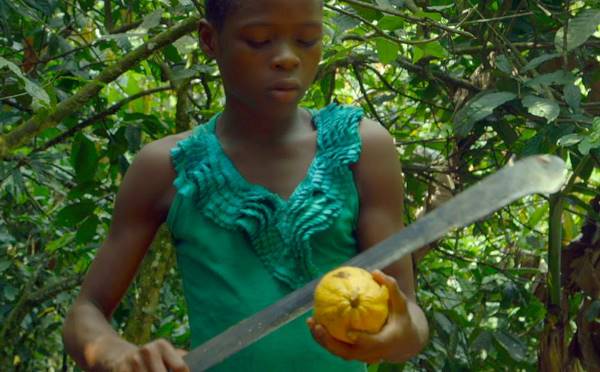This mostly solemn documentary utilizes plenty of footage of helpless children performing manual labor in squalid conditions, reportedly for long hours and little to no money. Frequently set to an ominous score, these shots are unflinching, the subjects staring back at the camera with a combination of shame, confusion, and fear in their eyes. During the film’s harrowing introductory sequence, in which police bust up a child labor ring in Northern India, one interviewee refers to the exploited as “children who are without dreams.”
But beyond the incredibly sobering street-level footage, Invisible Hands delves into how globalization has led to these kinds of sinister practices in poor and developing countries everywhere. Jumping from one location to the next, it returns time and again to the argument that the innocence and purity of childhood is being sacrificed for the cheap goods Western consumers demand, such as the palm oil that goes into a variety of prepackaged foods. In Indonesia, entire families toil in the rain forests, burning away foliage, and retrieving the fruitlets that get turned into oil. Because of high quotas, everyone must work, and as a result their children do not go to school.
As if that were not bad enough, the kids perform this dangerous work without gloves or masks, despite using chemicals known to cause serious illness later in life. According to another interviewee, local companies do not supply safety equipment because that would be admitting they hire very young workers in defiance of the law. As for the multinational corporations that purchase the palm oil, including chocolate producer Nestlé, one of its representatives uses the excuse of a multitiered supply chain, claiming it is impossible to know what is happening at the bottom rungs.
Director Shraysi Tandon deserves credit for shining a light on an issue as important as child exploitation. However, the flaw of Invisible Hands is that it repeats the same sad message over and over, with the only difference being the setting, which ranges from the cobalt mines of the Congo to the chocolate-growing orchards of Ghana to China’s industrial factories. Had the film spent time getting to know any of the activists it features, that could have helped to break up the monotony. Unfortunately, that never happens despite several intriguing possibilities, including Anas Aremeyaw Anas, a Ghanaian investigative journalist and master of disguise who leads the filmmakers to an outdoor market where human lives are put on sale like cattle. Yet even Anas remains frustratingly distant.
The only instance in which the film offers any kind of surprise is when it reveals child slavery occurring in modern-day America: specifically, in the agricultural sector, which was excluded from the Fair Labor Standards Act of 1938, a law banning the majority of harsh child labor. The film interviews kids as young as 12 years old, mostly the children of immigrants, who describe toiling 11 hours a day with only a single 20-minute break and no access to bathrooms. Worse, they tell stories of illness from exposure to tobacco plants and chemical pesticides. The film is rightfully damning of President Trump—who undid President Obama’s ban on the most hazardous of these chemicals—with the implication that Trump is in the powerful agricultural lobby’s pocket.
Invisible Hands spends considerable time arguing that the leaders of big multinational firms willfully turn a blind eye to the terrible conditions they are creating halfway across the world, and have also used their money and power to break the political system that is trying to keep their worst impulses in check. But instead of being out for blood, the film undergoes a tonal about-face down the home stretch, almost flattering the big corporations instead. For example, the filmmakers are unabashedly pro-Apple to a degree that makes one wonder if the consumer electronics giant was a co-producer. At one point, they laud the company for its transparency and refusal to purchase materials from companies with questionable practices, ignoring the fact that Apple’s products are also considerably more expensive than its competitors’, meaning it can afford to pay more for components.
Ultimately, the film paints a disheartening picture of how children in certain parts of the world are no better off than the slaves of centuries ago. Unfortunately, when it comes to changing the situation, the only remedy offered is buying goods from companies that certify no children were exploited to make their products. What goes missing is advice for those who wish to fight the mistreatment of children without necessarily accumulating more stuff.

















Leave A Comment